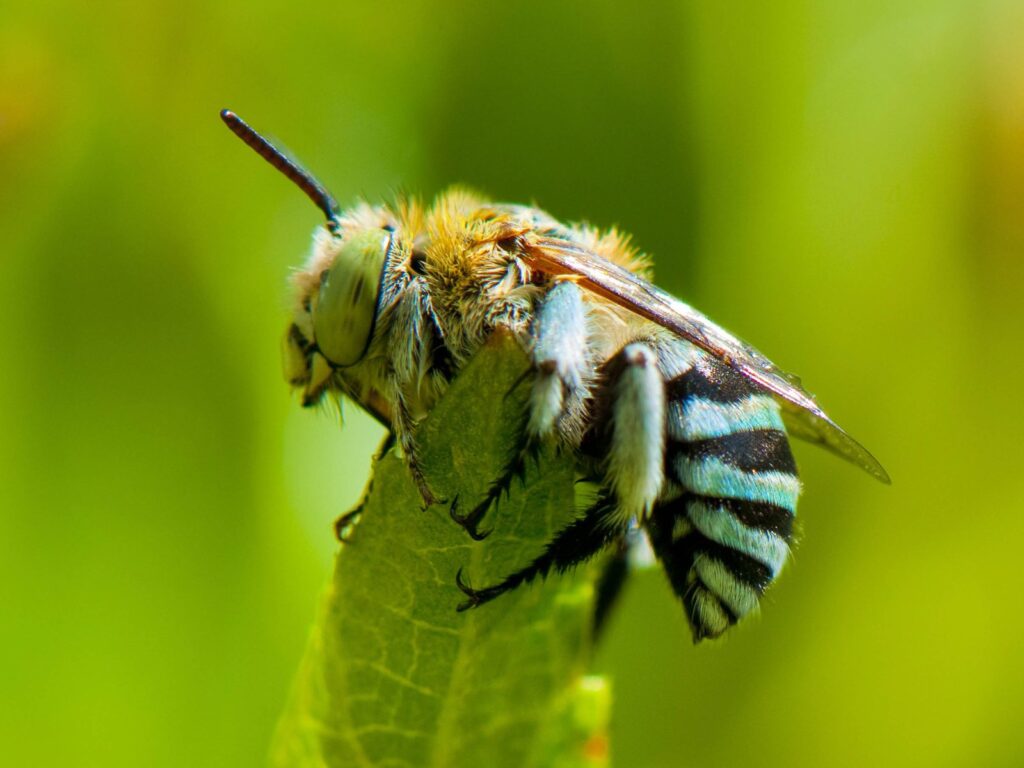Monday, 20 May, is World Bee Day – dedicated to acknowledging the role of bees and other pollinators in the ecosystem.

Associate Professor Alan Dorin, head of the Native Bee + Tech Facility at Monash University explains that as our climate becomes increasingly unstable, and land clearing for urban expansion and industrial agriculture continues in Australia, we must rapidly learn all we can about our native bees.
“They are potentially at risk of extinction. New technologies from artificial intelligence (AI) and computer science can help us understand their abundance and habits,” A/Prof Dorin said.
“We know very little about Australia’s 1600+ native bee species. They are certainly key pollinators of our native ecosystems and food crops. Learning to monitor and manage them is an important application for new technologies that can help us sustain our unique ecosystems and improve food security.
“Honeybee hives are increasingly monitored remotely using new technologies.This is especially important to allow proper management under climate change and the stress of pests, pathogens and even chemical pesticides. Uniquely, we are developing monitoring technologies for Australia’s native stingless bee hives. These bees are important crop and wildflower pollinators, and are not directly susceptible to Varroa mite which is spreading amongst our introduced European honeybee population.
“Remote digital insect monitoring stations allow us to identify insect species visiting crops and wildflowers. These new technologies assist us to be good custodians of Australia’s biodiversity, and to monitor pests and pathogens amongst introduced species such as the European honeybee we depend on for managed crop pollination.”
Dr Ronald Lee, School of Pharmacy, Monash University Malaysia, added that “Bees are vital to many aspects of life, including beneficial substances they produce such as honey, royal jelly and propolis.
“Propolis in particular is associated with several health benefits however, not realising its full potential, many bee farmers discard propolis as it is a resinous substance and tricky to use in its raw form.
“Not tapping into the potential of propolis is a wasted opportunity considering its potent medicinal value. Our team has found a way to salvage this incredible natural property, turning what many considered to be waste into liquid gold.
“Together we took up the challenge to produce the first liquid formulation for stingless bee propolis.Propolis was extracted using supercritical fluid extraction, which is environmentally-friendly due to the use of green solvents.
“In addition, it’s highly selective, yielding purer extraction. The product was formulated into a lipid-based delivery system with pharmaceutical-grade lipids and surfactants forming a golden-yellow solution.”
Associate Professor Adrian Dyer, Department of Physiology, Faculty of Medicine, Nursing and Health Sciences, adds that as we pivot to embrace new techologies and AI, there are even more lessons to be learned from our distant cousins, the bees!
“For over 100 million years bees have been successfully foraging in highly complex, and frequently changing, natural environments.
“All this is achieved with a miniaturised brain containing less than a million neurons (we have more neurons in the retina for each of our eyes), and the bee brain operates with a tiny energy budget for cognitive-like information processing.
“At Monash University we currently investigate the bio-inspired design principles that can be learnt from bees, and applied to the next generation of technology for both information processing, and the efficient management of food resources that frequently rely on bees for pollination.”
20,000 species
Dr Scarlett Howard, from the School of Biological Sciences, Faculty of Science at Monash says there are about 20,000 bee species across the globe but that Australian native bees are ecologically important.
“Australia hosts approximately 10 per cent of global bee diversity. Despite the importance of bees, we understand so little about the behaviour, ecology, and habitat of many of our native species in Australia.
“By exploring the world of understudied and lesser known Australian bee species, we have uncovered a wealth of knowledge regarding their roles in ecosystems, their intelligence, and their value in pollination. There is still so much more to learn about these fascinating and important pollinators.
“Traditionally, insects have been underestimated for their intelligence. Despite having miniature and seemingly simple brains, bees have shown a vast array of complex behaviours.
“Bees have shown intelligence in the form of face recognition, basic arithmetic, rudimentary tool use, problem-solving, rule-learning, and more. We continue to be amazed by the cognitive feats of different bee species from studies around the world.”


